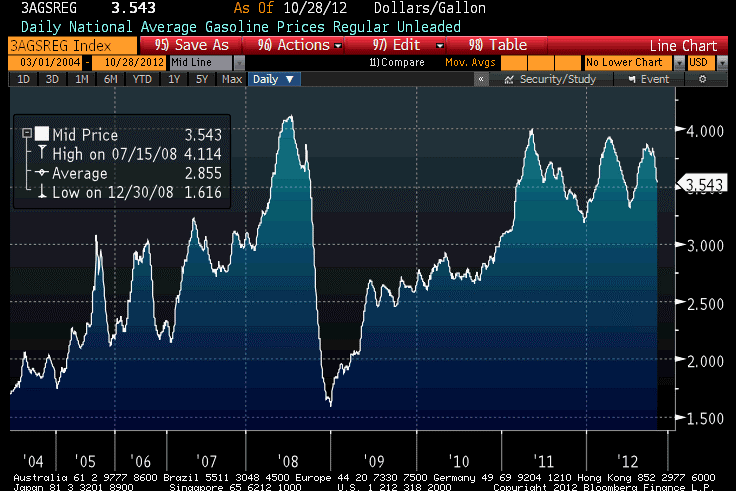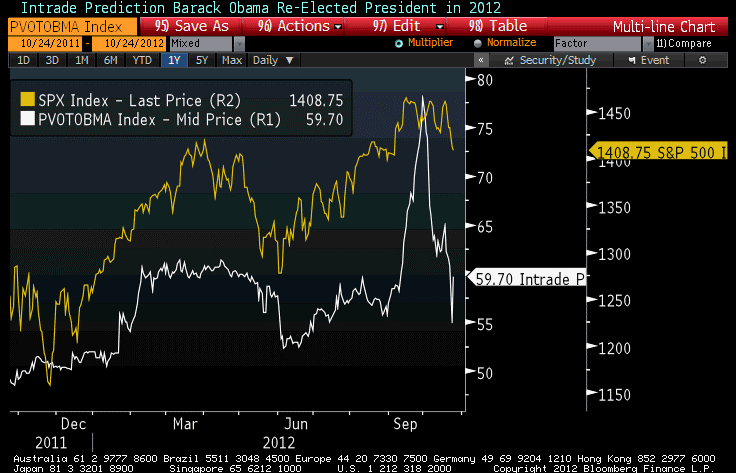Since the financial markets were almost shut yesterday due to “Frankenstorm,” and will in fact close early, I am writing this article early on the notion that (a) it will be difficult to write later and (b) there will be little additional news worth writing about.
Not much paradigm-changing economic data has come out recently. Thursday’s Durable Good numbers were approximately on-target (ex-transportation +2.0% versus +0.9% expected, but with a revision to August’s figures of -0.5%), as were Initial Claims (369k, right in the middle of the range) and Friday’s initial release of the Q3 GDP report (2.0% vs 1.8% expected, with Personal Consumption +2.0% vs +2.1% expected). Yesterday’s Personal Consumption and Spending reports were as-expected, as were all of the price deflators. The Dallas Fed Manufacturing Report was a bit stronger-than-expected but is merely back in the middle of the 3-year range.
There is, though, some positive economic news although it will take some time to be realized in the official figures. Gasoline futures recently approached the lows for the year (although in the last few days the approach of Hurricane Sandy and the general tightness in the delivery markets has caused a not-negligible rally), and retail gasoline prices which were recently threatening $3.90 are back to $3.54 (I wait with bated breath to see whether the people who shriek about the inflationary impact of gasoline rising will shriek with joy now that it’s falling – this volatility, folks, is why the Fed focuses on core inflation…not because they don’t drive). This is an unmitigated positive, if a small one, for the economy. While gasoline prices are still a multiple of where they were at the 2008 lows, they are only 18% above where they were to end 2007 (see chart, source Bloomberg).
Here is why dozens of chief executives have inserted themselves into the debate over reducing the federal budget deficit: Some say uncertainty over the looming “fiscal cliff” of tax increases and spending cuts already is hurting their business. “It’s a pause button,” Robert Swanson, executive chairman of Linear Technology Corp., told investors Oct. 17, after the semiconductor maker reported a 3% drop in fiscal first-quarter profit. Chief Financial Officer Paul Coghlan said companies that use Linear’s chips are growing more cautious before the election and the Dec. 31 deadline.
It isn’t merely the fiscal cliff itself. I’ve heard from a number of potential clients (in the financial industry and elsewhere) that there is great uncertainty associated with the results of the election itself. While the ‘fiscal cliff,’ a collection of tax increases and spending cuts that automatically kick in at year-end if Congress and the President do not agree to an alternative budget, could cause great short-term damage to growth in 2013, business-owners also believe that for the first time in the last half-dozen or so elections the results of the Presidential contest will have a significant effect on the business climate going forward. From a taxation perspective, on the basis of the future of Obamacare, on the degree of regulatory intrusiveness, the candidates seem to differ much more significantly than were McCain v. Obama, Bush v. Kerry, Bush v. Gore, Clinton v. Dole, or Clinton v. GHW Bush. Arguably Dukakis vs. GHW Bush showed a meaningful difference, and certainly Reagan v. Mondale, but it has been a generation since the election was thought to matter very much to business. This year, it certainly does. A storm is coming on November 6th, but like Frankenstorm it will pass.
But that doesn’t mean the election frees the stock market. I believe that a Romney victory (which is the current odds-on bet since undecideds typically break heavily for the challenger and he already has a lead overall and is tied or ahead in every important battleground state) would send stocks lower, while an Obama victory would send them higher – in the short term. The reason I believe this is that I think investors will interpret a Romney victory as producing a greater chance of fiscal austerity (relatively, that is – we’re not getting any important austerity in this country for a while) and a greater chance of a less-accommodative Fed over the next couple of years especially when a President Romney would replace Bernanke (whose term is up in January 2014) with a hawkish Chairman. These things would be more likely to produce a deeper recession in 2013 than we are already likely to get under Obama.
However, let me be clear: I think the Romney policies are closer to the correct policies, and I am highly confident that the stock market in five years would be significantly higher under Romney’s stated policies than under Obama’s. But the stock market is full of short-term-focused investors these days, and the more immediate focus would be on the near-term implications of a change from a relatively profligate fiscal and monetary policy (that anaesthetizes near-term pain even as our limbs are sawed off) to one that aggressively moves to address the nation’s financial future sanely, at a somewhat higher short-term cost.
The data seems to support this. Below is a chart combining the Intrade market for the probability of President Obama’s re-election (in white) and the S&P 500 (Source: Bloomberg), showing that this phenomenon has existed for a while. There is some argument that the causality runs the other way – that a lower stock market indicates a slower economic outlook and therefore a lower likelihood of Obama’s re-election, and I agree there is some circularity there. But I suspect the current consensus view, that a Romney victory is a big win for “risk-on” assets, is wrong in the short-term.
Now, I should say that I think Intrade investors are far off on the actual probabilities, but the point is the direction of movement. Also note that because the Intrade market is a binary option that either ends up at 100 or 0, it will naturally gain volatility as the market gets closer to election day. A similar effect will happen in the equity market, but it will not of course be as pronounced. (See my note on the subject of option-like market behavior here.)
I expect to get some partisan vitriol on this article. Save it – the power is going to be out, and so your anger will go unrequited! (Do you think it was an accident that I wrote this article today?!) Good luck to all in the hurricane’s path. It’s going to be a bumpy ride.
- English (UK)
- English (India)
- English (Canada)
- English (Australia)
- English (South Africa)
- English (Philippines)
- English (Nigeria)
- Deutsch
- Español (España)
- Español (México)
- Français
- Italiano
- Nederlands
- Português (Portugal)
- Polski
- Português (Brasil)
- Русский
- Türkçe
- العربية
- Ελληνικά
- Svenska
- Suomi
- עברית
- 日本語
- 한국어
- 简体中文
- 繁體中文
- Bahasa Indonesia
- Bahasa Melayu
- ไทย
- Tiếng Việt
- हिंदी
Two Storms Coming
Published 10/30/2012, 01:11 AM
Updated 02/22/2024, 09:00 AM
Two Storms Coming
Latest comments
Loading next article…
Install Our App
Risk Disclosure: Trading in financial instruments and/or cryptocurrencies involves high risks including the risk of losing some, or all, of your investment amount, and may not be suitable for all investors. Prices of cryptocurrencies are extremely volatile and may be affected by external factors such as financial, regulatory or political events. Trading on margin increases the financial risks.
Before deciding to trade in financial instrument or cryptocurrencies you should be fully informed of the risks and costs associated with trading the financial markets, carefully consider your investment objectives, level of experience, and risk appetite, and seek professional advice where needed.
Fusion Media would like to remind you that the data contained in this website is not necessarily real-time nor accurate. The data and prices on the website are not necessarily provided by any market or exchange, but may be provided by market makers, and so prices may not be accurate and may differ from the actual price at any given market, meaning prices are indicative and not appropriate for trading purposes. Fusion Media and any provider of the data contained in this website will not accept liability for any loss or damage as a result of your trading, or your reliance on the information contained within this website.
It is prohibited to use, store, reproduce, display, modify, transmit or distribute the data contained in this website without the explicit prior written permission of Fusion Media and/or the data provider. All intellectual property rights are reserved by the providers and/or the exchange providing the data contained in this website.
Fusion Media may be compensated by the advertisers that appear on the website, based on your interaction with the advertisements or advertisers.
Before deciding to trade in financial instrument or cryptocurrencies you should be fully informed of the risks and costs associated with trading the financial markets, carefully consider your investment objectives, level of experience, and risk appetite, and seek professional advice where needed.
Fusion Media would like to remind you that the data contained in this website is not necessarily real-time nor accurate. The data and prices on the website are not necessarily provided by any market or exchange, but may be provided by market makers, and so prices may not be accurate and may differ from the actual price at any given market, meaning prices are indicative and not appropriate for trading purposes. Fusion Media and any provider of the data contained in this website will not accept liability for any loss or damage as a result of your trading, or your reliance on the information contained within this website.
It is prohibited to use, store, reproduce, display, modify, transmit or distribute the data contained in this website without the explicit prior written permission of Fusion Media and/or the data provider. All intellectual property rights are reserved by the providers and/or the exchange providing the data contained in this website.
Fusion Media may be compensated by the advertisers that appear on the website, based on your interaction with the advertisements or advertisers.
© 2007-2024 - Fusion Media Limited. All Rights Reserved.
